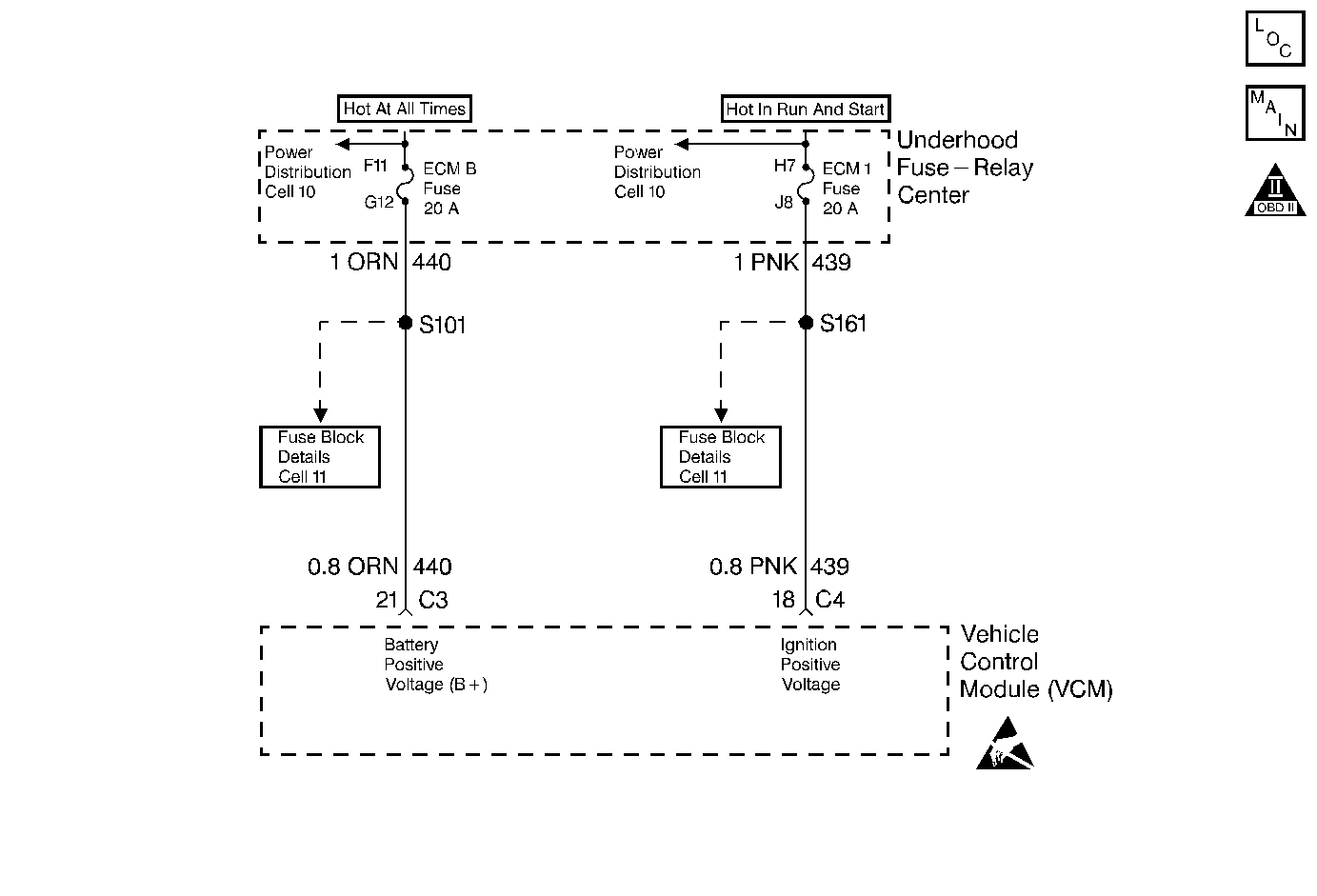
Circuit Description
Circuit 439 is the ignition voltage feed for the VCM. Circuit 440 is the battery voltage feed for the VCM.
When the VCM detects a low voltage or a high voltage, then DTC P0560 sets. DTC P0560 is a type D DTC.
Conditions for Setting the DTC
| • | The system voltage is low: |
| - | The engine speed is greater than 1250 RPM. |
| - | The system voltage is less than 10.5 volts at a maximum transmission temperature of 151°C (304°F). |
| - | The system voltage is less than 6.7 volts at a minimum transmission temperature of -40°C (-40°F). |
| - | All conditions met for 4 seconds |
| • | The system voltage is high:the system voltage is greater than 19 volts for 2 seconds. |
Action Taken When the DTC Sets
| • | All transmission output devices are OFF. |
| • | The VCM freezes shift adapts from being updated. |
| • | The VCM does not illuminate the Malfunction Indicator Lamp (MIL). |
Conditions for Clearing the DTC
| • | A scan tool can clear the DTC from the VCM history. The VCM clears the DTC from the VCM history if the vehicle completes 40 warm-up cycles without a failure reported. |
| • | The VCM cancels the DTC default actions when the fault no longer exists and the ignition is OFF long enough in order to power down the VCM. |
Diagnostic Aids
| • | Inspect the wiring for poor electrical connections at the VCM. Look for the following conditions: |
| - | A bent terminal |
| - | A backed out terminal |
| - | A damaged terminal |
| - | Poor terminal tension |
| - | A chafed wire |
| - | A broken wire inside the insulation |
| • | When diagnosing for an intermittent short or open condition, massage the wiring harness while watching the test equipment for a change. |
| • | Charging the battery with a battery charger may set DTCs. Jumpstarting an engine may set DTCs. |
| • | If DTCs set when you operate an accessory, inspect the applicable wiring for faulty connections. Inspect the wiring for excessive current draw. |
| • | Inspect the following items for faulty connections: |
| - | The starter solenoid |
| - | The fusible link |
| - | The generator terminals |
| • | Inspect the belts for excessive wear. Inspect the belts for proper tension. |
| • | Inspect the VCM ground circuits for ground integrity. |
Test Description
The numbers below refer to the step numbers on the diagnostic table.
-
This step tests the charging system voltage.
-
This step tests battery voltage input at the VCM.
-
This step tests ignition voltage input at the VCM.
Step | Action | Value(s) | Yes | No | ||||
|---|---|---|---|---|---|---|---|---|
1 | Was the Powertrain On-Board Diagnostic (OBD) System Check performed? | -- | Go to Powertrain OBD System Check | |||||
2 |
Important: Before clearing the DTCs, use the scan tool in order to record the Failure Records for reference. The Clear Info function will erase the data. Important: If any other DTCs are present, refer to the applicable diagnostic charts before continuing. Is the voltage measured greater than the specified value? | 10.5 volts | Go to Battery Diagnosis, Section 6D1 | |||||
3 | Start the engine and warm to normal operating temperature. Is the generator/check engine lamp ON? | -- | Go to Charging System Diagnosis, Section 6D3 | |||||
Is the system voltage within the specified range? | 13-15 volts | Go to Charging System Diagnosis, Section 6D3 | ||||||
Is there a voltage variance between the voltage measured at the battery (taken in Step 2) and at terminal C3-21 that is greater than the specified value? | 0.5 volts | |||||||
6 | Repair the high resistance condition in circuit 440. Refer to Electrical Diagnosis, Section 8A. Is the repair complete? | -- | -- | |||||
Is there a voltage variance between the voltage measured at the battery (taken in Step 2) and at terminal C4-18 that is greater than the specified value? | 0.5 volts | |||||||
8 | Repair the high resistance condition in circuit 439. Refer to Electrical Diagnosis, Section 8A. Is the repair complete? | -- | -- | |||||
9 | Replace the VCM. Refer to VCM Replacement, Section 6. Is the replacement complete? | -- | -- | |||||
10 | In order to verify your repair, perform the following procedure:
Has the test run and passed? | -- | System OK |
